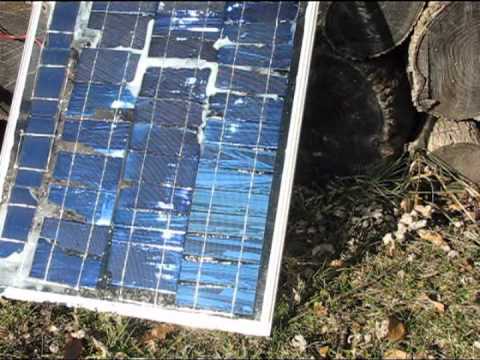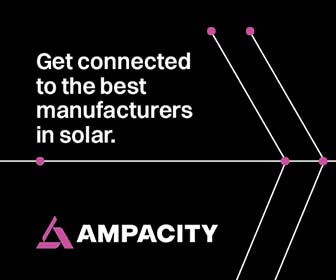Recycling a Solar System - Part 2 Practical actions for managing solar module waste
In the second of this two-part series, we focus on the actual waste management concepts related to solar panels, and the steps every company should take to develop a program for used solar cell components.
The first order of business: establish your risk tolerance as an organization. Some organizations choose to be more conservative than others. This decision point will likely drive the remainder of the decision-making process. To protect your organization from the EPA and/or repetitional risks, take note of the following key points.
Packaging is Key
Pay attention to how solar modules are packaged after removal from the racking. For those panels considered suitable enough for reuse, management must require careful handling to reduce the possibility of cell damage from mechanically aided lifting.
For scrap panels - ensure that glass and other materials are not getting dislodged and landing on the ground. In some cases, the EPA can consider this a disposal or a spill. To help prevent the spillage in storage and transit, use either a pallet with a solid top, or a corrugated tray with the edges bent up around the panels at 90 degrees (in addition to the banding and stretch wrap).
With new modules coming off a highly automated assembly line, robots precisely palletize the modules for safe shipment and placement in the racking for operations. Contrast this with the conditions of a solar farm on vacant desert land or an agricultural field, where pallets have been on the site since the installation - chances are they are weather rotted, the OEM spacers and other original packaging having long since disappeared. Even the basic step of loading the modules onto a truck without reliable protective packaging or a dock can risk damaging them.
Ensure Operability
 When selling or donating PV Equipment for reuse, you must provide evidence of operability of the units by using appropriate testing methods. It is well documented that the cells within a solar module are susceptible to micro cracking and other damage during handling. When it comes to handling a used solar module, the number of steps alone increases the probability of damage.
When selling or donating PV Equipment for reuse, you must provide evidence of operability of the units by using appropriate testing methods. It is well documented that the cells within a solar module are susceptible to micro cracking and other damage during handling. When it comes to handling a used solar module, the number of steps alone increases the probability of damage.
Flash testing and visual inspection may not be enough to ensure that the modules being sold are free from latent defects that can cause long-term underperformance. Even if production is performed to best-known practices, shipping and installation may be damaging for the modules delivered to a project site. For PV modules, EL is the technology of choice to detect micro cracks, which can be a signature of mishandling
Select a Vendor
Develop a process and metrics for choosing which vendor will manage the solar modules (reuse or waste). Ensure that any "advice" provided by the vendor is verified. Developing and implementing strategies to deal with e-waste is essential for companies of all size and in all industries. Minimizing waste, recycling electronics, managing the risks of disposal, and complying with regulations at the local, state, federal, and international levels are all important considerations. Compliance with appropriate regulations means knowing and understanding which laws and treaties apply to the particular waste in question, keeping proper records, and meeting permitting requirements.
Companies working with vendors to handle their e-waste can avoid liability by assessing vendors at the onset, and auditing them throughout the disposal process. Vendors should be required to provide assurance as to their ability to meet regulatory requirements, and present evidence that requisite permits and certifications are in place. To deal with these complexities, organizations may want to seek help from a provider with expertise in health, safety, and environmental compliance services. For e-waste, those services can include assessing the waste to determine proper handling; providing guidance on waste management and disposal; and evaluating disposal vendors to ensure they have proper certifications and valid permits (as well as reveal any past violations).

To avoid compliance lapses, companies may want help in reporting and record keeping requirements. Training, written program development, R2 Certification, EICC conformance, auditing, and permitting are other valuable services that companies may want to consider. As they work to optimize their e-waste management strategies, companies should seek to confirm that their insurance program provides the appropriate coverage for e-waste exposures that cannot be avoided by their proactive risk management efforts. Premises pollution liability policies can provide coverage for environmental risks on a particular site (including remediation when necessary), as well as coverage for liability arising from releases during transportation of e-waste, and releases from properly permitted third-party disposal sites. Companies may want to consider a policy that provides coverage for their entire business operations, whether on their own premises or at third-party locations. Also, for firms involved in e-waste management, contractor's pollution liability coverage can provide insurance for environmental risks at project sites owned by another entity - whether it be a government body or private company.
Responsibly disposing of solar panels has become a complicated business. Previously unregulated e-waste management practices have become subject to new and evolving regulations. Best practices dictate enlisting the help of experts in this rapidly evolving field. Check with your insurer - they may be willing to pay for associated auditing, training or other risk management services tailored for e-waste as part of a comprehensive coverage program. Safety is paramount, for both your company and the environment.
AJ Orben is Vice President, and Dwight Clark is Director of Compliance and Recycling Technology at We Recycle Solar, a single-source disposal provider for excess, recalled, and end-of-life solar products.
We Recycle Solar | werecyclesolar.com
Author: Dwight Clark, CHMM and AJ Orben
Volume: 2020 May/June









.png?r=1362)


